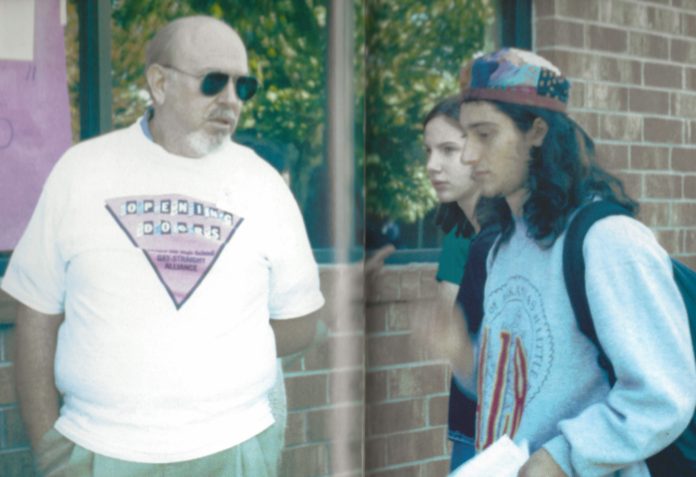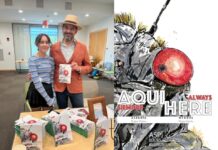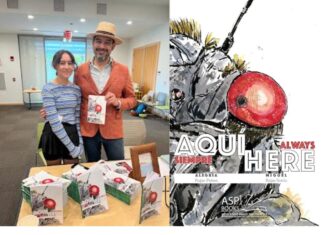
QSA at 25: Part Two
This article is the second in a series of articles examining the founding and legacy of the Queer-Straight Alliance at Chapel Hill High School.
1994 proved to be a watershed year for Chapel Hill High School.
It became the first high school in the state to create a Gay-Straight Alliance (GSA) following controversy at the start of the decade.
“The nineties were a particular time because ‘gay’ went from being a total secret that only comes out in a few safe spaces to being hyper-analyzed on TV [and] in the news, with countless straight celebrities capitalizing on what had been a unique and secret culture,” Chapel Hill alumnus Michael Feezor said. “Teenagers in the middle of puberty, gay or straight, simply don’t have the resources to process that kind of thing.”
Feezor, an occasional attendee of GSA meetings in the late 1990s, became associated with the club in its earliest years.
The club’s foundation came in the midst of tumult and cultural shifts at Chapel Hill. English teacher David Bruton—the founder of the club and its first faculty advisor—became the subject of harassment following his inclusion of gay and lesbian literature in his multicultural literature project in the early 1990s.
“The outcry from the community was surprising to me because I saw this as a more open community,” former Chapel Hill guidance counselor Mary Gratch said. “Dave was my good friend, so it was just horrible.”
Incidents included a dead possum left in Bruton’s classroom and several instances of obscene vandalism.
Bruton had served as a faculty advisor for a student group called Cultural Awareness Sensitivity Educators (CASE) since 1990. CASE consisted of 50 to 75 students and several faculty advisors.
The group received a request from a student asking for issues gay students faced to be discussed at a meeting.
“All of the faculty advisors wanted to help this student, but you can imagine how uncertain we all were about how we could do it,” Bruton said. “I insisted that we could not refuse a request from a student who was obviously hurting. So a few weeks later, we had a CASE meeting with some Parents and Friends of Gays and Lesbians parents and their gay sons as speakers.”
The meeting filled two social studies classrooms. Bruton reported no problems.
“The students asked good, respectful questions,” he said.
The school board had begun to encourage schools and teachers to integrate multicultural perspectives into the curriculum in 1993. Bruton followed the board’s encouragement.
“The United States is a nation of immigrants—as we, of late, seem to forget—from many cultures,” Bruton said. “Between the activities of CASE and my participation in it and the board’s request, my independent study American Multicultural Literature Project was born.”
Backlash was quick and furious.
Bruton’s worry stretched far beyond himself.
“Yes, the vandalism was directed at me,” Bruton said, “but students saw it. LGBTQ students saw it.”
One of the most brazen acts of violence against Bruton occurred when the school buses parked directly outside Bruton’s classroom were graffitied with homophobic slurs before their routes around town that morning.
Bruton responded with conscious attempts to become visible at Chapel Hill. Every day after the bus incident —the first of several instances of vandalism—he would leave his room during class changes, speak to students and colleagues and walk around campus during lunch.
“[I wanted to show that] gay men don’t cower and hide,” Bruton said.
The desire for visibility extended to the newly formed GSA, today called the Queer-Straight Alliance, at Chapel Hill.
The club began as a series of informal meetings both in and outside school for Bruton, other faculty members and students to discuss the issues of sexuality and homophobia at Chapel Hill prior to the Multicultural Plan controversy.
Bruton became the club’s first unofficial advisor in November 1992, leading the group along with involvement from Gratch.
Other members of Chapel Hill faculty also helped jumpstart the club, but some may have felt uncomfortable voicing their opinions as a result of the harassment Bruton was enduring at the time.
“Some faculty members didn’t feel like they could take a stand,” Gratch said. “There were faculty members who would have liked to be allies but didn’t feel that they could speak out.”
Students who joined the GSA, also feeling pressure from Chapel Hill’s atmosphere, sometimes chose to remain anonymous or secretive in their membership.
Feezor recalled the pressure he felt to avoid association with the club in an effort to ward off ridicule.
“In those days, no one was really comfortable being ‘out’ and, personally, I felt some fear that going to the classroom where the meetings were held could get me picked out as someone to bully,” he said.
After a few meetings, Bruton chose to have the club be largely student-led.
The club’s first goals were to educate students and faculty about the club and inform them that there would be a safe space to discuss sexuality at Chapel Hill. Some of the club’s efforts also reached beyond the school, as club members sought to educate the community, such as through its participation in the AIDS walk, an event still held each year around the Triangle.
GSA members also participated in the National Day of Silence, when demonstrators remain silent for a day to symbolize the struggle of people who have been forced to keep silent about their sexuality. The club was also integral in the implementation of a Safe Zone program at Chapel Hill, where teachers received training and had their rooms as designated spaces where students could discuss sexuality without judgement or ridicule.
Bruton recalled an incident reflecting the atmosphere at Chapel Hill for LGBTQ students during the 1990s.
A student, Eddy, had been called a pejorative slur towards the end of Bruton’s poetry lesson one day.
“Eddy, I want to talk about feelings,” Bruton remembered saying as Eddy went to leave the classroom.
Eddy responded by asking what he had done. Bruton told him he had not done anything and that he wanted to talk about Eddy’s feelings; Eddy responded that his feelings did not matter.
“But [your feelings matter] to me, I hope I said as he paused an instant in the door, before being swept up in hall traffic,” Bruton recalled. “If he had paused and looked back at me, I would have been totally and completely incapable of saying anything more because I was weeping. Not crying. Weeping, because I knew how Eddy really felt.”
Bruton continued advocating for LGBTQ students for the remainder of his career.











